|
|
|
Sort Order |
|
|
|
Items / Page
|
|
|
|
|
|
|
| Srl | Item |
| 1 |
ID:
097696
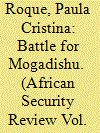

|
|
|
|
|
| Publication |
2009.
|
| Summary/Abstract |
The period January-July 2009 has witnessed the descent of Somalia from a promising
state of political accommodation and the success of the Djibouti peace process in January
to a state of politico-military anarchy that was highlighted by the Al Shabaab and Hizbul
Islam surge for Mogadishu in May 2009.
|
|
|
|
|
|
|
|
|
|
|
|
|
|
|
|
| 2 |
ID:
075152
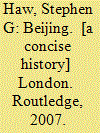

|
|
|
|
|
| Publication |
London, Routledge, 2007.
|
| Description |
xi, 212p.hbk
|
| Series |
Routledge Studies in the Modern History of Asia
|
| Standard Number |
0415399068
|
|
|
|
|
|
|
|
|
|
|
|
Copies: C:1/I:0,R:0,Q:0
Circulation
| Accession# | Call# | Current Location | Status | Policy | Location |
| 051965 | 951.156/HAW 051965 | Main | On Shelf | General | |
|
|
|
|
| 3 |
ID:
089137
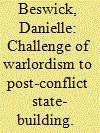

|
|
|
|
|
| Publication |
2009.
|
| Summary/Abstract |
Using evidence from the case of Congo, focusing in particular on the eastern Kivu provinces, this article argues that the enduring presence of warlords, and the influence of their international supporters, remains inadequately addressed by current practices of post-conflict state-building. The dominant contemporary model of state-building currently focuses on the promotion of liberal democracy as a way of avoiding future conflict, highlighting in particular the key role of elections. Simultaneously, it emphasises the importance of security and developing a state monopoly on violence. However, in the pursuit of both these ends in Congo, warlord politics and interference from regional powers continue to pose significant challenges. Exploring key aspects of the rebel movement led by Laurent Nkunda in east Congo (2004-2009), this article will illustrate some of the challenges warlordism poses in Congo, focusing particularly on the shortcomings of a 'single sovereign' approach to state-building. In conclusion, the experience of the Kivus indicates that an approach recognising multiple sovereignties or emphasising significant decentralisation may be more appropriate. Without such a shift in emphasis the notion that Congo is, or will soon become, an empirically functional state is perhaps wishful thinking.
|
|
|
|
|
|
|
|
|
|
|
|
|
|
|
|
| 4 |
ID:
108767
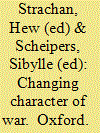

|
|
|
|
|
| Publication |
Oxford, Oxford University Press, 2011.
|
| Description |
x, 564p.
|
| Standard Number |
9780199596737
|
|
|
|
|
|
|
|
|
|
|
|
Copies: C:1/I:0,R:0,Q:0
Circulation
| Accession# | Call# | Current Location | Status | Policy | Location |
| 056384 | 355.02/STR 056384 | Main | On Shelf | General | |
|
|
|
|
| 5 |
ID:
045862
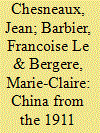

|
|
|
|
|
| Publication |
Sussex, Harvester Press, 1977.
|
| Description |
vii, 372p.: mapshbk
|
| Standard Number |
0855277602
|
|
|
|
|
|
|
|
|
|
|
|
Copies: C:1/I:0,R:0,Q:0
Circulation
| Accession# | Call# | Current Location | Status | Policy | Location |
| 017549 | 951.04/CHE 017549 | Main | On Shelf | General | |
|
|
|
|
| 6 |
ID:
031989


|
|
|
|
|
| Publication |
New York, McGraw-Hill Book Company, 1969.
|
| Description |
159p.pbk
|
|
|
|
|
|
|
|
|
|
|
|
Copies: C:1/I:0,R:0,Q:0
Circulation
| Accession# | Call# | Current Location | Status | Policy | Location |
| 009018 | 951.05/ROB 009018 | Main | On Shelf | General | |
|
|
|
|
| 7 |
ID:
029714
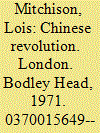

|
|
|
|
|
| Publication |
London, Bodley Head, 1971.
|
| Description |
111p.
|
| Series |
Bodley head contemporary history
|
| Standard Number |
0370015649
|
|
|
|
|
|
|
|
|
|
|
|
Copies: C:1/I:0,R:0,Q:0
Circulation
| Accession# | Call# | Current Location | Status | Policy | Location |
| 007713 | 951/MIT 007713 | Main | On Shelf | General | |
|
|
|
|
| 8 |
ID:
180199
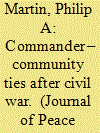

|
|
|
|
|
| Summary/Abstract |
Ex-rebel military commanders play a central role in peacebuilding after civil war. Yet the influence and mobilization power of these actors is not uniform: in some areas commanders retain strong ties to civilian populations after war’s end, while in other areas such ties wither away. This article analyses a novel dataset of former rebel-occupied localities in Côte d’Ivoire to investigate why commander–community linkages endure or decline after post-conflict transitions. The findings support a theory of political accountability: commanders retained political capital and access to networks of supporters in areas where insurgents provided essential goods to civilians during war. By contrast, where insurgents’ wartime rule involved abuse and coercion, commanders were less likely to sustain strong ties. These findings challenge the conventional wisdom that violent warlordism explains the persistence of rebel commanders’ power in peacetime. Rather, effective wartime governance may create regionally embedded strongmen who can in turn disrupt postwar state-building.
|
|
|
|
|
|
|
|
|
|
|
|
|
|
|
|
| 9 |
ID:
140113
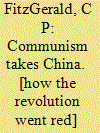

|
|
|
|
|
| Publication |
New York, British Commonwealth and American Heritage Press, 1971.
|
| Description |
127p.hbk
|
|
|
|
|
|
|
|
|
|
|
|
Copies: C:1/I:0,R:0,Q:0
Circulation
| Accession# | Call# | Current Location | Status | Policy | Location |
| 007845 | 951/FIT 007845 | Main | On Shelf | General | |
|
|
|
|
| 10 |
ID:
096706
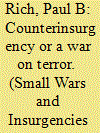

|
|
|
| 11 |
ID:
153619
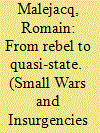

|
|
|
|
|
| Summary/Abstract |
How do warlords build their legitimacy and eventually exert authority? The case of Afghan leader Ahmad Shah Massoud demonstrates that warlords do not only build legitimacy through the internal provision of goods and services to the population under their control, but also build their legitimacy by projecting authority externally, through the development of their own form of diplomacy. In this article, I show that warlords develop complex and complementary legitimisation strategies that extend beyond their territorial realms to include consequential relationships with foreign actors.
|
|
|
|
|
|
|
|
|
|
|
|
|
|
|
|
| 12 |
ID:
082935
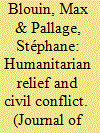

|
|
|
|
|
| Publication |
2008.
|
| Summary/Abstract |
The authors examine the effects that famine relief efforts (food aid) can have in regions undergoing civil war. In the model, warlords seize a fraction of all aid entering the region. How much they can loot affects their choice of army size; therefore the manner in which aid is delivered influences warfare. The authors identify a delivery plan for aid that minimizes total recruitment in equilibrium
|
|
|
|
|
|
|
|
|
|
|
|
|
|
|
|
| 13 |
ID:
071448
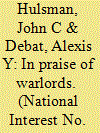

|
|
|
| 14 |
ID:
114634
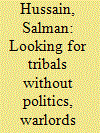

|
|
|
|
|
| Publication |
2012.
|
| Summary/Abstract |
The post-September 11 narrative of the drug economy attempts to isolate this 'problem' to the space of Afghanistan locally by stressing the tropes of tribalism and warlordism. In this narrative, these two phenomena are framed as obstacles in building a strong state and its institutions and ensuring development in Afghanistan. In contrast, I propose to understand tribalism and warlordism as political and historical categories, both in the sense of their discursive use as well as their function in Afghan social and political life, as Afghans organized themselves, but were also organized by others - though not in isolation, but in continuous engagement with these others. I place this analysis within the broader discussion of understanding how the Cold War interventions affected the organizing of political power in Afghanistan.
|
|
|
|
|
|
|
|
|
|
|
|
|
|
|
|
| 15 |
ID:
000922
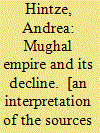

|
|
|
|
|
| Publication |
Hampshire, Ashgate, 1997.
|
| Description |
xii, 299p.hbk
|
| Standard Number |
0860786110
|
|
|
|
|
|
|
|
|
|
|
|
Copies: C:1/I:0,R:0,Q:0
Circulation
| Accession# | Call# | Current Location | Status | Policy | Location |
| 040384 | 954.025/HIN 040384 | Main | On Shelf | General | |
|
|
|
|
| 16 |
ID:
113662
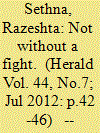

|
|
|
| 17 |
ID:
086334
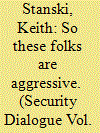

|
|
|
|
|
| Publication |
2009.
|
| Summary/Abstract |
Afghan warlords' are some of the most maligned actors in US debates about Afghanistan. These figures are vilified as exemplifying some of the darkest moments in Afghanistan's recent history. Yet, they are also lauded for their contributions to the future of the Afghan state or, in some cases, recast as seemingly less vicious characters, such as `local commanders' or `militia leaders'. This article situates US conceptions of `Afghan warlords' in a historical and comparative context by returning to arguably the West's most formative exposure to Afghanistan, the First Anglo-Afghan War (1838-42). A discursive analysis of primary and secondary sources from both periods reveals that longstanding Orientalist archetypes about the `Afghan people' and their violent tendencies continue to influence US thought about `Afghan warlords'. The article concludes that recent concern about `Afghan warlords' should be understood as part of the longer, and still unresolved, construction of a violent Afghan `Other' in Anglo-American political thought.
|
|
|
|
|
|
|
|
|
|
|
|
|
|
|
|
| 18 |
ID:
098865


|
|
|
|
|
| Publication |
2010.
|
| Summary/Abstract |
Afghanistan is often depicted as a failing state, but its failures display distinctive patterns over time and space. Regional variations in governance have been important in shaping the ways the Afghan state has failed and the consequences of these failures. This article argues that a history of better governance in the north facilitated the disarmament of militia warlords and comparative stability. By contrast, the south has a long history of minimal formal governance, creating opportunities for increased Taliban insurgency.
|
|
|
|
|
|
|
|
|
|
|
|
|
|
|
|
| 19 |
ID:
124149


|
|
|
|
|
| Publication |
2013.
|
| Summary/Abstract |
NATO troops are leaving Afghanistan in 2014, a quarter of a century after Soviet troops ended their occupation. How comparable are the two retreats, and will Afghans suffer fighting and destruction similar to what happened when foreign troops last left? Mikhail Gorbachev, who took the withdrawal decision in 1985, felt the war had become an expensive stalemate. The USSR opted to base its exit strategy on diplomacy and the idea that the Afghan government should pursue peace talks with its armed opponents. This emphasis on negotiations differs from Obama's policy, which remains predominantly military and rejects compromise with the Taliban. Obama and NATO claim progress on the battlefield and argue that combat duties can safely be "transitioned" to newly trained Afghans. But most Afghans are gloomy. Although they do not expect Kabul to fall to the Taliban, they believe that the insurgents will capture large parts of southern Afghanistan. Many also fear that ethnic tensions will grow throughout the country, perhaps leading to conflict between warlords from the Tajik and Uzbek minorities and the Pashtun majority.
|
|
|
|
|
|
|
|
|
|
|
|
|
|
|
|
| 20 |
ID:
103123
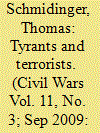

|
|
|
|
|
| Publication |
2009.
|
| Summary/Abstract |
Failed states that foster warlords and terrorists are now an increasing challenge to state stability across the Middle East. This paper uses the case studies of Iraq and Sudan to show how a neo-liberal policy of dismantling the public sector by an illegitimate regime that combines tribalisation with the arbitrary use of power leads to dramatic weakening of the state and an increase in warlordism.
|
|
|
|
|
|
|
|
|
|
|
|
|
|
|
|
|
|
|
|
|